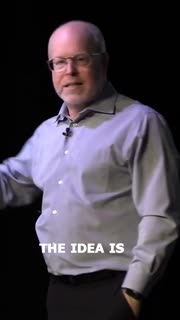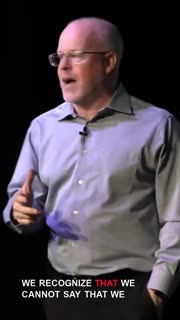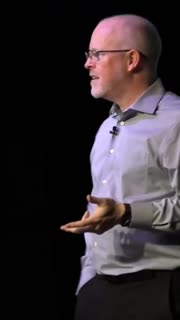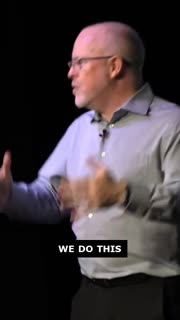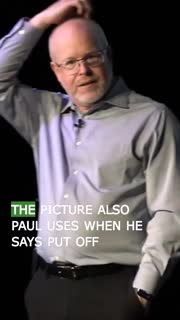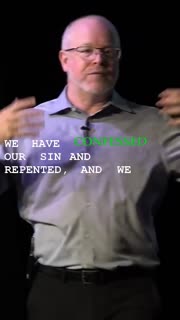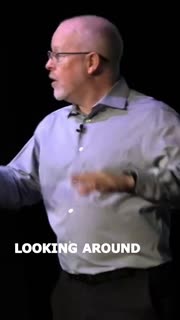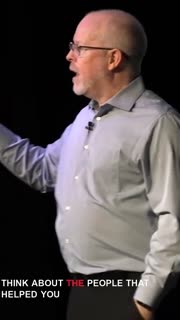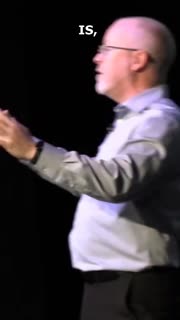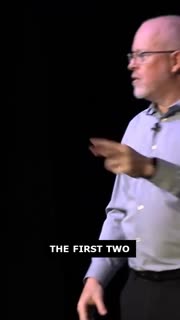Embracing the Journey of Discipleship and Legacy
Devotional
Sermon Summary
Bible Study Guide
Sermon Clips
1. "The idea is that you cannot expect to be transformed if you don't participate in the process. If you're waiting for lightning to strike or waiting for somebody to do it for you, no, it requires for you to step into that. That's what Paul's saying. It's a deliberate process. In this school of discipleship, we're called to learn. We're called to be transformed." [48:41] (25 seconds)
2. "We recognize that we cannot say that we live in the kingdom and continue to live and act as if we live in this present evil age. And it's a lot of work. In concept, it's easy to understand. It's very simple. Put off one, rethink how you're doing things, and put on the new. That's very simple. It is extraordinarily complicated and taxing and requires our deliberate focus to make happen." [48:02] (27 seconds)
3. "The hardest thing is to deny ourselves. We have, the main issue, I don't know if you've put this together or seen this, the main issue in our culture today is not political, it's not even really social. It is based around identity. Identity. And what Holmes talks about is that we are really good at creating a God in our own image who is like us, who accepts our indiscretions, who gives us a license and leniency, and then we label this God the God of love." [51:01] (40 seconds)
4. "We do this as an act of love toward God. We recognize that we cannot say that we live in the kingdom and continue to live and act as if we live in this present evil age. And it's a lot of work. In concept, it's easy to understand. It's very simple. Put off one, rethink how you're doing things, and put on the new. That's very simple. It is extraordinarily complicated and taxing and requires our deliberate focus to make happen." [47:33] (32 seconds)
5. "The picture also Paul uses when he says put off the old is a rotten, rotten garment. You ever have those? Men love those, by the way. You know why we love them? Because they're broken in. Because it's that T-shirt we love, we've had that's older than our children, that it just fits to our body. It's that pair of jeans we've worn down that looks like at any moment that if we touch it, it's just going to fall to pieces." [46:21] (28 seconds)
6. "We have confessed our sin and repented, and we have turned to Christ and said, I will live this life following after Christ. We have already done that. And because we have done that, we can no longer live that we used to live. Paul says that these two things are simply incompatible. They cannot exist together. And because God has granted us this grace, we should live this way. We should put off the old. We should reimagine what it means to follow Christ, think about it, turn over in our minds a different way of thinking, and in turn put on the new." [43:07] (47 seconds)
7. "We need to quit looking around for our parents. Their time has come and gone. They're still there. They're still advising. They're still a part, but now they have turned that over, whether deliberately or unconsciously to us, and it dawned on me, we are leading now. We're doing, our children are doing for us what we once did with our parents. Tell this story. Talk about this. My grandparents are gone, and the legacy they passed on has now landed, and I'm trying to pass that on to my children." [56:49] (34 seconds)
8. "Think about the people that helped you and become those people for others. That's passing on the legacy. If we do that, then 170 years from now, someone else will be telling the story of what we did with the legacy that was given to us, and they will become the stewards of it. That's what discipleship is. passing on to the next generation what has been passed on to us. May we do that in the name of the Father and the Son, and the Holy Spirit." [59:27] (43 seconds)
9. "The truth of the matter is, at some point, those garments that we love are too rotten for us. We just can't wear them. what we come to discover as we adjust our thinking is we realize that the way we used to do things, we just can't do anymore. And not because somehow God will love us more if we change our behavior, but precisely because He loves us already. we've already experienced the power of salvation in our life. We've already experienced it. We've already experienced what it means to be transformed." [47:33] (42 seconds)
10. "The first two things that have to happen for us to be in a correct attitude and posture to follow Christ is we have to deny ourselves, we have to take on the identity of Christ and who he calls us to be, and we have to be willing to lay down our life for the purpose of the gospel. That's the school to which Paul is calling, the Ephesians, and by extension, us." [52:35] (24 seconds)
Ask a question about this sermon
2. "We recognize that we cannot say that we live in the kingdom and continue to live and act as if we live in this present evil age. And it's a lot of work. In concept, it's easy to understand. It's very simple. Put off one, rethink how you're doing things, and put on the new. That's very simple. It is extraordinarily complicated and taxing and requires our deliberate focus to make happen." [48:02] (27 seconds)
3. "The hardest thing is to deny ourselves. We have, the main issue, I don't know if you've put this together or seen this, the main issue in our culture today is not political, it's not even really social. It is based around identity. Identity. And what Holmes talks about is that we are really good at creating a God in our own image who is like us, who accepts our indiscretions, who gives us a license and leniency, and then we label this God the God of love." [51:01] (40 seconds)
4. "We do this as an act of love toward God. We recognize that we cannot say that we live in the kingdom and continue to live and act as if we live in this present evil age. And it's a lot of work. In concept, it's easy to understand. It's very simple. Put off one, rethink how you're doing things, and put on the new. That's very simple. It is extraordinarily complicated and taxing and requires our deliberate focus to make happen." [47:33] (32 seconds)
5. "The picture also Paul uses when he says put off the old is a rotten, rotten garment. You ever have those? Men love those, by the way. You know why we love them? Because they're broken in. Because it's that T-shirt we love, we've had that's older than our children, that it just fits to our body. It's that pair of jeans we've worn down that looks like at any moment that if we touch it, it's just going to fall to pieces." [46:21] (28 seconds)
6. "We have confessed our sin and repented, and we have turned to Christ and said, I will live this life following after Christ. We have already done that. And because we have done that, we can no longer live that we used to live. Paul says that these two things are simply incompatible. They cannot exist together. And because God has granted us this grace, we should live this way. We should put off the old. We should reimagine what it means to follow Christ, think about it, turn over in our minds a different way of thinking, and in turn put on the new." [43:07] (47 seconds)
7. "We need to quit looking around for our parents. Their time has come and gone. They're still there. They're still advising. They're still a part, but now they have turned that over, whether deliberately or unconsciously to us, and it dawned on me, we are leading now. We're doing, our children are doing for us what we once did with our parents. Tell this story. Talk about this. My grandparents are gone, and the legacy they passed on has now landed, and I'm trying to pass that on to my children." [56:49] (34 seconds)
8. "Think about the people that helped you and become those people for others. That's passing on the legacy. If we do that, then 170 years from now, someone else will be telling the story of what we did with the legacy that was given to us, and they will become the stewards of it. That's what discipleship is. passing on to the next generation what has been passed on to us. May we do that in the name of the Father and the Son, and the Holy Spirit." [59:27] (43 seconds)
9. "The truth of the matter is, at some point, those garments that we love are too rotten for us. We just can't wear them. what we come to discover as we adjust our thinking is we realize that the way we used to do things, we just can't do anymore. And not because somehow God will love us more if we change our behavior, but precisely because He loves us already. we've already experienced the power of salvation in our life. We've already experienced it. We've already experienced what it means to be transformed." [47:33] (42 seconds)
10. "The first two things that have to happen for us to be in a correct attitude and posture to follow Christ is we have to deny ourselves, we have to take on the identity of Christ and who he calls us to be, and we have to be willing to lay down our life for the purpose of the gospel. That's the school to which Paul is calling, the Ephesians, and by extension, us." [52:35] (24 seconds)
